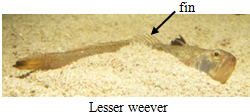10.

The Dangers at the Beach
British beaches look harmless,but there are hidden dangers.
Allergy
The lesser weever is the fish to look out for on British beaches.It lies almost buried in the sand with just its mouth and fin exposed,a trap for unlucky fishermen and beachgoers walking around in the shallows.If you stand on a weever fish,it'll sting (刺) you badly.The sting may cause heart attacks,and shock,though usually it just causes pain,redness and swelling.
Many people have an allergic reaction to the fish and may start to sweat,develop a faster heartbeat and feel sick as the poison gets further into the body.People who have been stung should take painkillers and if they develop an allergic reaction to the sting,an antihistamine (a drug used to treat an allergy) is recommended.
Sea currents
But fish are the least of your worries on the beach.The force of the sea is much more dangerous than anything swimming about inside it.
Coastguards are warning the public not to swim if there is a red flag flying on a beach and to find out about local tides and currents.
Dangerous swimming
The Coastguard Agency says people should not swim if they feel unwell,for at least an hour after a meal,if they have been drinking alcohol or if they are cold and tired.They also warn against swimming alone,swimming too far out to sea if you have breathing problems.
Pollution
A recent study of UK beaches showed more than 10% are failing to meet standards for clean water.The Marine Conservation Society said polluted water was still being pumped into the sea in some areas and was winding its way onto beaches.But the water companies say the society's standards are too tough and that 90% of British beaches pass European standards.
56.What can we learn about the lesser weever from the passage?B
A.Its poison can be washed off by water.
B.Its sting is usually serious.
C.It buries itself deep in the sand.
D.It can be dangerous on the beach.
57.From the passage,we know you'd better swimC.
A.when there is a red flag flying on the beach
B.when there are strong sea currents
C.together with friends
D.just after eating
58.Which of the following can best describe the UK beaches?A
A.Most beaches in the UK are fine.
B.There is no pollution on UK beaches.
C.Most beaches fail to meet European standards.
D.10% of British beaches meet European standards.

 The Dangers at the Beach
The Dangers at the Beach